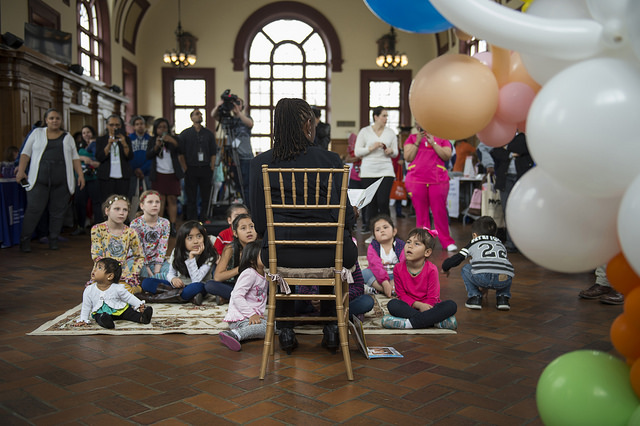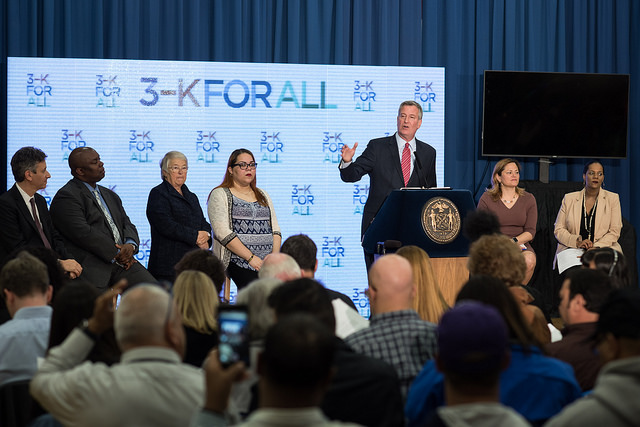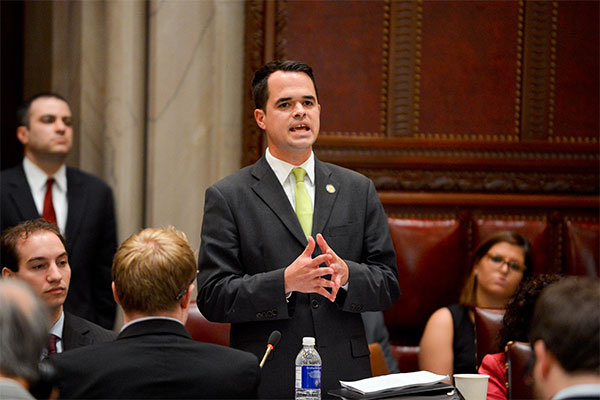The Diversity Visa: A Ticket To A Better Life

(photo: Ed Reed/Mayor's Office)
This past October my mom passed the United States citizenship exam. On November 7, she became a U.S. citizen. And this past December my dad passed the United States citizenship exam. On January 31, he became a U.S. citizen. Soon, my sisters and I will become U.S. citizens as well. None of this was guaranteed to us, and it almost didn’t happen.
My family is from Bangladesh. We moved to the United States in July 2011 through the Diversity Visa process, which is currently being called into question at the federal level, especially after a recent terrorist attack in New York City. The experience of my family -- me, my parents, and my two younger sisters -- is a testament to what the Diversity Visa program can do for people, and for the United States, a country we are proud to call home.
Simply put, the Diversity Visa changed our lives. It gave us a second chance. It allowed me to be where I am today: 15 years old and a tenth-grader in a New York City high school.
In Bangladesh, my dad was a businessman, running a company called Nicos Digital Color Lab. Armed with a bachelor’s degree, he was also a self-taught photographer, and sometimes taught computer lessons to high school students. My mom has a master’s degree, and helped to support our home.
Back in Bangladesh, there was a lot of pressure on my parents: my grandparents, two cousins, two uncles, and an aunt all lived with us in the same house. My dad paid all of our family’s expenses, and my mom cooked and took care of everyone. The entire family depended on my parents, and it put an obvious strain on their marriage. Things began to fall apart between my mom and my dad. Since they were the caretakers, though, no one much noticed.
One day, when my dad was in his Color Lab staring at his computer screen, one of his friends stopped by and asked for a cigarette. He told my dad to apply for the Diversity Visa to the U.S.
My dad laughed at first, “A common person like me, with no extraordinary talents, living in a small town in a country named Bangladesh, will get a visa to go to the United States?”
My dad’s friend smiled and told him to ask my mom to apply. “Your wife is your lucky charm. Her application will get accepted.” My parents quickly filled out an application under my mom’s name.
Soon after, we received a first letter notifying us that we had been selected, and then a second letter notifying us that we would be interviewed. After an extensive vetting process, we were approved. My mom, my sisters, and I were given a visa. A month later, my dad’s visa was approved as well. While the process may seem easy, it was not. It took time, preparation for the interviews, and anxiety until the visas were in hand.
As we looked up airline tickets to go to the U.S., we realized we didn’t have enough money to get there. But, we soon found, miraculously, that our family was surrounded by supportive guardian angels. All my dad’s childhood best friends came to our rescue. They all contributed, not only helping to pay for our plane tickets, but providing extra money to survive in the U.S. as we started our new lives.
After moving to the U.S. and gaining employment, my dad paid all their money back. But we will never be able to give back the generosity, kindness, and opportunity they gave us. I am forever grateful to my dad’s friends for helping to change our lives.
In the years since, we have established our lives in the U.S. It has not been easy. My father, a former businessman, works as a taxi driver. My mother, with her master’s degree, takes care of my sisters and me. We all go to school, studying for a better future for our family. But we feel so lucky to be living in the United States. It has changed our lives immeasurably.
If we were still in Bangladesh, I’m confident that my family would have fallen apart, and my parents might have separated. My sisters and I wouldn’t have been able to receive a proper education because education in Bangladesh costs so much. I wouldn’t be independent, navigating the subways of New York City on my own. I wouldn’t have my parents as close to me as they are to me right now, and they probably wouldn’t be able to give much time to my sisters and me as they do right now. My parents wouldn’t be able to financially support my grandparents and all their siblings as they do now.
Getting settled here in the United States was not easy; it still isn’t. Adjusting to the new environment around us, being away from our extended family, hearing threats because we are Muslims and people see us as foreigners. But life is better. And there is the possibility of an even better future. A future I work toward every day at school.
That is what the Diversity Visa has meant to me. A ticket to a better life.
The United States is my home. It always has been. I may not be born here, but I am an American. I love this country so much. The Diversity Visa changed my family’s life forever. For that for so many Americans to come, I pray we do not get rid of it.
***
Laila Dola is a high school student in Queens and a former member of the Generation Citizen Student Leadership Board.
***
Have an op-ed idea or submission for Gotham Gazette? Email This email address is being protected from spambots. You need JavaScript enabled to view it.
Education Adrift: New Chancellors Needed for City School, University Systems

Mayor de Blasio, Chancellor Fariña & others (photo: Michael Appleton/Mayor's Office)
Lame duck chancellors now lead New York’s school and university systems. Governor Cuomo, who controls the CUNY board, and Mayor de Blasio, who appoints the schools chancellor, each show a shocking lack of urgency to fill these critical posts.
This is intolerable. Education is the driver of our information age. Social progress and economic prosperity depend on a vibrant public sector commitment. The city Department of Education enrolls a million children, pre-K through grade 12. CUNY enrolls 275,000 undergraduate and graduate students. Yet our elected leaders allow these essential institutions to remain rudderless.
Our schools and colleges should be brimming with excitement. New technologies, exploding fields of scientific endeavor, novel business opportunities, and a wealth of artistic media make this a particularly fertile time to teach and to learn. A new generation of education leaders is needed to meet this challenge, ready to bring vision and creativity to jobs that have become handmaidens to parochial political interests.
The leadership vacuum holds us back. New York’s position as the World’s Capital is threatened by educational backsliding and neglect. When Mayor de Blasio announced that Carmen Fariña’s successor would be cut from the same mold, my heart sank. Not that she’s been a bad chancellor but because we need a new chancellor, filled with original ideas and vision.
And who beside insiders even know the CUNY Chancellor’s name? James Milliken announced his departure three months ago after just three years on the job. His tenure has been marked by defending repeated charges of long-term fiscal mismanagement. Belated filling of vacancies on the CUNY board by Governor Cuomo and tensions surrounding appointment of City College’s new president added to system-wide stasis, a lost opportunity when Columbia, NYU, and Cornell’s new Roosevelt Island campus are all expanding.
Union leadership has been complicit in this lack of forward motion, settling into predictable cycles of management opposition and compliance for short-term interests. But Michael Mulgrew of the UFT and Barbara Bowen of PSC-CUNY, each safely ensconced in their positions, should do much more. New York labor leaders have historically been national figures, fighting tooth-and-nail for their members and the public good. Innovative contract terms can be an engines for implementing instructional progress if union sights are raised above routine salary demands.
Current belt-tightening by the federal, state, and city governments should not be an excuse for treading water. If anything, the budget picture requires increased institutional agility. Consolidation of organizational structures may be necessary, requiring different operational strategies. Principled reform of antiquated or unneeded functions can be catalyzed by cuts. Public officials’ well-known motto that “no serious crisis should go to waste” requires courage and consensus to implement. This is a challenge that requires new thinking, pointing again to the need for immediate change in the city’s top education posts.
This is a propitious moment for such change. With two ambitious politicians on the cusp of filling these leadership positions, a coordinated approach to New York City’s educational future is possible. Perhaps the Cuomo-de Blasio feud can find a moment of détente or realization that their mutual self-interest dictates summitry. With claims to being The Education Governor and The Education Mayor, the high-visibility appointment of quality chancellors for each of their fiefs will send a message of optimism and renewal that both can use to their advantage. Let us hope this flickering possibility can light our educational future.
- - -
David C. Bloomfield is Professor of Educational Leadership, Law & Policy at Brooklyn College and The CUNY Graduate Center. On Twitter @BloomfieldDavid.
***
Have an op-ed idea or submission for Gotham Gazette? Email This email address is being protected from spambots. You need JavaScript enabled to view it.
Three Voting Reforms New York Must Pass This Year

State Senator David Carlucci, the author
New York’s voting laws are woefully outdated and lag behind much of the rest of our country. Too many New Yorkers experience unfair and unnecessary restrictions when they wish to exercise their constitutional right to vote. Unsurprisingly, New York consistently ranks near the bottom in voter turnout when compared to other states.
According to 24/7 Wall St., an average of only 59.2% of eligible New York voters voted in the presidential elections from 2000 through 2012. That makes New York 42nd among the 50 states in voter turnout. As disappointing as these figures are, voter turnout has been even lower in midterm and state elections. This is why we need voting reform in our state.
I applaud Governor Cuomo’s 30-day budget amendment that calls for $7 million to fund early voting in counties across the state. New York is one of only 13 states that does not offer early voting, a deficiency we must change now. New Yorkers are busy, having the convenient option to go to the polls up to 12 days before Election Day means people don’t have to choose between going to work or school and voting. It is time we join the other 37 states and the District of Columbia (Washington, D.C.) and provide New Yorkers with access to early voting. A recent Siena College poll indicates that 65% of New Yorkers support early voting.
Automatic voter registration (AVR) is another proposal that New York should adopt. AVR allows people to be automatically registered to vote when they interact with the Department of Motor Vehicles. People would no longer have to worry about registration deadlines or application submissions. After witnessing the success of AVR in Oregon, eight other states have approved it. No citizen should ever be denied his or her constitutional right to vote, and we should make the registration process easy and convenient. I have fought for legislation to enact AVR since 2015. This is the year to pass it.
Finally, same-day voter registration (SDR) should be enacted so eligible New York voters can register to vote the same day they go to the polls. This eliminates registration deadlines people may miss. Fifteen states and Washington, D.C. have adopted some form of SDR. In their report entitled “America Goes to the Polls 2016,” Nonprofit VOTE and the U.S. Elections Project claim that same-day voter registration “has the most discernible impact on increasing voter turnout.” These organizations estimate that since 1996, states that allow SDR have experienced voter turnout seven to 13 points higher, on average, than states without SDR.
For too long, New York voting laws have suppressed voter turnout and have discouraged public participation in governance. I stand by the Governor’s plan to reform voting, and I encourage my fellow elected representatives to enact these proposals.
***
David Carlucci is the state senator representing the 38th Senate district. On Twitter @DavidCarlucci.
***
Have an op-ed idea or submission for Gotham Gazette? Email This email address is being protected from spambots. You need JavaScript enabled to view it.




